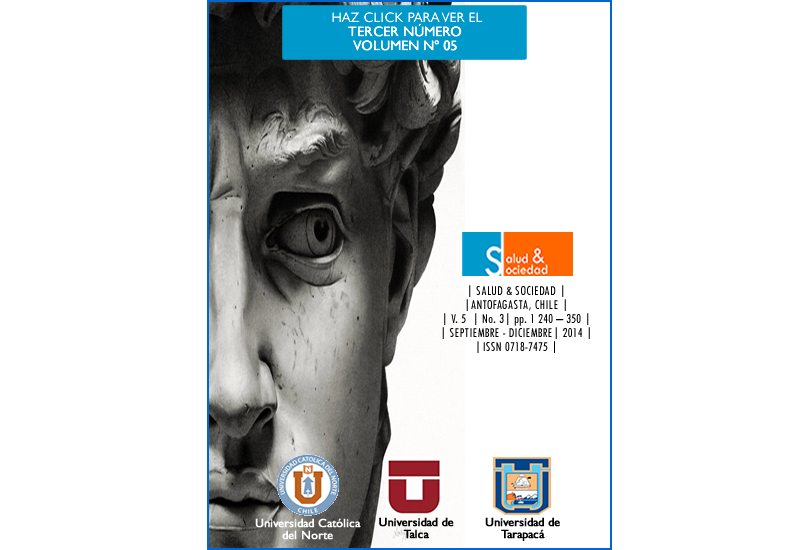Right-wing authoritarianism, social dominance orientation, empathy, and materialistic value orientation as predictors of Intergroup prejudice in Argentina
DOI:
https://doi.org/10.22199/S07187475.2014.0003.00004Keywords:
Authoritarianism, empathy, intergroup prejudice, social dominance, Autoritarismo, dominancia social, empatía, prejuicio intergrupal,Abstract
The study of individual differences in prejudice has received significant attention in the psychological literature. However, very little research has been published on Latin American countries. To address this gap, 300 residents from the general population in Mar del Plata, Argentina, were surveyed. The main objective of the study was to assess the contributions of right-wing authoritarianism (RWA), social dominance orientation (SDO), empathy, and materialistic value orientation (MVO) to the prediction of ethnic prejudice, heterosexism, hostile sexism, and benevolent sexism after controlling for impression management and socio demographic factors. Multiple regression analyses identified RWA as the most relevant variable predicting intergroup prejudice; as it contributed to the prediction of all dependent variables. The contributions of SDO, empathy, and MVO depended on the specific type of prejudice assessed. SDO and empathy made a significant statistical contribution to the prediction of ethnic prejudice and heterosexism; while a materialistic value orientation contributed only to the prediction of hostile sexism.
Introducción: El estudio de las diferencias individuales en el prejuicio ha recibido mucha atención en la literatura psicológica. Sin embargo, han sido muy pocas las publicaciones de investigaciones en Latinoamérica. Objetivo : evaluar las contribuciones del autoritarismo de derecha (RWA), la orientación a la dominancia social (SDO), la empatía, y la orientación hacia valores materiales (MVO) a la predicción del prejuicio étnico, el heterosexismo, el sexismo hostil, y el sexismo benevolente luego de controlar para el manejo de impresión y los factores socio-demográficos. Método: fueron encuestados 300 participantes en Mar del Plata, Argentina, con edad entre 19 y 71 años, a través de las Escalas de Autoritarismo de Derecha, Escala de Valores Materiales, y Actitudes hacia la Homosexualidad. Resultados: Los análisis de regresión múltiple identificaron al RWA como la variable más importante en la predicción de prejuicio intergrupal; ya que aportó a la predicción de todas las variables dependientes. Las contribuciones de SDO, empatía, y MVO dependieron del prejuicio evaluado. La SDO y la empatía aportaron estadísticamente a la predicción del prejuicio étnico y el heterosexismo; mientras que la orientación hacia los valores materiales solamente a la predicción del sexismo hostil.
Downloads
References
Abrams, D., Rutland, A., & Cameron, L. (2003). The development of subjective group dynamics: Children’s judgments of normative and deviant in-group and out-group individuals. Child Development, 74(6), 1840–1856.
Adorno, T. W., Frenkel-Brunswik, E., Levinson, D. J., & Sanford, R. N. (1950). The authoritarian personality. Oxford, England: Harpers.
Altemeyer, B. (1981). Right-Wing Authoritarianism. Winnipeg, Canada: University of Manitoba Press.
Altemeyer, B. (1988). Enemies of Freedom: Understanding Right-Wing Authoritarianism. San Francisco: Jossey-Bass.
Altemeyer, B., & Hunsberger, B. E. (1992). Authoritarianism, religious fundamentalism, quest, and prejudice. International Journal for the Psychology of Religion, 2(2), 113-133.
Altemeyer, B. (1998). The other “authoritarian” personality. Advances in Experimental Social Psychology, 30, 47-91.
Altemeyer, B. (2006). The authoritarians. http://home.cc.umanitoba.ca/~altemey
Bäckström, M., & Björklund, F. (2007). Structural modeling of generalized prejudice: The role of social dominance, authoritarianism, and empathy. Journal of Individual Differences, 28(1), 10–17.
Barrero Cuellar, E. (2008). Psicología social del autoritarismo: Apuntes para una psico-historia del conflicto armado colombiano. Tesis Psicológica, 3, 86-97.
Brislin, R. W. (1986). The wording and translation of research instruments. In W. J. Lonner & J. W. Berry (Eds.), Field methods in cross-cultural research., Cross-cultural research and methodology series; Vol. 8 (pp. 137-164). Thousand Oaks, CA US: Sage Publications.
Cárdenas, M., Meza, P., Lagues, K., & Yañez, S. (2010). Adaptación y validación de la escala de orientación a la dominancia social (SDO) en una muestra Chilena. Universitas Psychologica, 9(1), 161-168.
Cárdenas, M., & Parra, L. (2010). Adaptación y validación de la escala abreviada de autoritarismos de derecha (RWA) en una muestra chilena. Revista de Psicología, 19(1),
Davis, M. H. (1983). Measuring individual differences in empathy: Evidence for a multidimensional approach. Journal of Personality and Social Psychology, 44(1), 113-126.
Díaz-Lázaro, C. M., & Toro-Alfonso, J. (2014). La contribución estadística del autoritarismo, la dominancia social, la empatía y el materialismo a la varianza del prejuicio intergrupal en Puerto Rico. Revista Puertorriqueña de Psicología, 25 (1), 118-137.61-79.
Duckitt, J. (1989). Authoritarianism and group identification: A new view of an old construct. Political Psychology, 10(1), 63–84.
Duckitt, J. H. (1992). Psychology and prejudice: A historical analysis and integrative framework. American Psychologist, 47(10), 1182–1193.
Duckitt, J. (2001). A dual-process cognitivemotivational theory of ideology and prejudice. In M. P. Zanna (Ed.), Advances in experimental social psychology, Vol. 33. (pp. 41-113). San Diego, CA US: Academic Press.
Duckitt, J., & Sibley, C. G. (2007). Right wing authoritarianism, social dominance orientation and the dimensions of generalized prejudice. European Journal of Personality, 21(2), 113-130.
Duckitt, J., & Sibley, C. G. (2009). A dualprocess motivational model of ideology, politics, and prejudice. Psychological Inquiry, 20(2-3), 98–109.
Duckitt, J., Wagner, C., du Plessis, I., & Birum, I. (2002). The psychological bases of ideology and prejudice: Testing a dual process model. Journal of Personality and Social Psychology, 83(1), 75–93. doi:10.1037/0022-3514.83.1.75
Duriez, B., & Van Hiel, A. (2002). The march of modern fascism: A comparison of social dominance orientation and authoritarianism. Personality and Individual Differences, 32, 1199-1213.
Duriez, B., Van Hiel, A., & Kossowska, M. (2005). Authoritarianism and Social Dominance in Western and Eastern Europe: The Importance of the Sociopolitical Context and of Political Interest and Involvement. Political Psychology, 26(2), 299-320.
Expósito, F., Moya, M. C., & Glick, P. (1998). Sexismo ambivalente: medición y correlatos. Revista de Psicología Social, 13(2), 159-169.
Gallardo, R.Y. (1999). Chilean translation of the Balanced Inventory of Desirable Responding (BIDR-6). Unpublished scale. University of Concepción, Chile.
Glick, P., & Fiske, S. T. (1996). The Ambivalent Sexism Inventory: Differentiating hostile and benevolent sexism. Journal of Personality and Social Psychology, 70(3), 491-512.
Greenberg, J., Pyszczynski, T., & Solomon, S. (1986). The causes and consequences of the need for selfesteem: A terror management theory. In R. F. Baumeister (Ed.), Public self and private self (pp. 189-207). New York: Springer-Verlag.
Higgins, E. T. (1997). Beyond pleasure and pain. American Psychologist, 52, 1280-1300.
Hogg, M. A, & Abrams, D. (2001). Intergroup relations: Essential readings. New York: Taylor & Francis.
Jones, A. (2011). Genocide: A comprehensive introduction. New York, NY: Routledge.
Jost, J. T., Glaser, J., Kruglanski, A. W., & Sulloway, F. J. (2003). Political conservatism as motivated social cognition. PsychologicalBulletin, 129, 339–375.
Jugert, P., & Duckitt, J. (2009). A motivational model of authoritarianism: Integrating personal and situational determinants. Political Psychology, 30(5), 693–719.
Jugert, P., Cohrs, J. C., & Duckitt, J. (2009). Inter- and intrapersonal processes underlying authoritarianism: The role of social conformity and personal need for structure. European Journal of Personality, 23(7), 607–621.
Kasser, T., Ryan, R. M., Couchman, C. E., & Sheldon, K. M. (2004). Materialistic values: Their causes and consequences. Psychology and consumer culture: The struggle for a good life in a materialistic world., 11-28. Washington DC: American Psychological Association.
Kite, M. E., & Deaux, K. (1986). Attitudes toward homosexuality: Assessment and behavioral consequences. Basic and Applied Social Psychology, 7(2), 137-162.
Kreindler, S. A. (2005). A Dual Group Processes Model of Individual Differences in Prejudice. Personality and Social Psychology Review, 9(2), 90–107.
Kruglanski, A. W. (1989). Lay epistemics and human knowledge: Cognitive and motivational basis. New York: Plenum.
McFarland, S. (2010). Authoritarianism, social dominance, and other roots of generalized prejudice. Political Psychology, 31(3), 453-477.
McFarland, S. G., & Adelson, S. (1996). An omnibus test study of personality, values, and prejudice. Paper presented at the annual meeting of the International Society for Political Psychology. Vancouver, British Columbia.
Moghaddam, F. M. (2011). Multiculturalism and intergroup relations: Psychological implications for democracy in global context. Washington, DC: American Psychological Association.
Paulhus, D. L. (1984). Two-component models of socially desirable responding. Journal of Personality and Social Psychology, 46, 598–609.
Pérez-Albéniz, A., de Paúl, J., Etxeberría, J., Montes, M. P., & Torres, E. (2003). Adaptación de Interpersonal Reactivity Index (IRI) al español. Psicothema, 15(2), 267-272.
Pratto, F., Sidanius, J., Stallworth, L. M., & Malle, B. F. (1994). Social dominance orientation: A personality variable predicting social and political attitudes. Journal of Personality and Social Psychology, 67(4), 741-763. doi:10.1037/0022-3514.67.4.741
Pratto, F., Sidanius, J., & Levin, S. (2006). Social dominance theory and the dynamics of intergroup relations: Taking stock and looking forward. European Review of Social Psychology, 17, 271-320.
Quinton, W. J., Cowan, G., & Watson, B. D. (1996). Personality and actitudinal predictors of support of proposition 187 – California anti-illegal-immigrant initiative. Journal of Applied Social Psychology, 26, 2204-2223.
Richins, M. L., & Dawson, S. (1992). A consumer values orientation for materialism and its measurement: Scale development and validation. Journal of Consumer Research, 19(3), 303-316.
Richins, M. L., Mick, D. G., & Monroe, K. B. (2004). The material values scale: Measurement properties and development of a short form. Journal of Consumer Research, 31(1), 209-219.
Roets, A., Van Hiel, A., & Cornelis, I. (2006). Does materialism predict racism? Materialism as a distinctive social attitude and a predictor of prejudice. European Journal of Personality, 20(2),155-168. doi:10.1002/per.573
Rottenbacher de Rojas, J. M. (2010). Sexismo ambivalente, paternalismo masculino e ideología política en adultos jóvenes de la ciudad de Lima. Pensamiento Psicológico, 7 (14), 9-18.
Rottenbacher de Rojas, J. M., Amaya López, L., Genna Miyahira, Pulache Páez, M. (2009). Percepción de inseguridad ciudadana y su relación con la ideología política en una muestra de habitantes de la ciudad de Lima. Revista Española de Investigación Criminológica, 7, 1-22.
Sidanius, J., & Pratto, F. (1999). Social dominance: An intergroup theory of social hierarchy and oppression. New York: Cambridge University Press.
Silván-Ferrero, M. P., & Bustillos, A. (2007). Adaptación de la escala de orientación a la dominancia social al castellano: Validación de la dominancia grupal y la oposición a la igualdad como factores subyacentes. Revista de Psicología Social 22(1), 3-15.
Smith-Castro, V. (2006). La psicología social de los procesos intergrupales: Modelos e hipótesis. Actualidades en Psicología, 20, 45-71.
Son Hing, L. S., Chung-Yan, G. A., Hamilton, L. K., & Zanna, M. P. (2008). A two-dimensional model that employs explicit and implicit attitudes to characterize prejudice. Journal of Personality and Social Psychology, 94(6), 971–987.
Son Hing, L. S., & Zanna, M. P. (2010). Individual differences. In J. F. Dovidio, M. Hewstone, P. Glick, & V. M. Esses (Eds.) The Sage Handbook of Prejudice, Stereotype, and Discrimination, (pp.163-178). London, U.K: Sage
Stephan, W. G., & Finlay, K. (1999). The role of empathy in improving intergroup relations. Journal of Social Issues, 55(4), 729-743.
Stöber, J., Dette, D. E., & Musch, J. (2002). Comparing continuous and dichotomous scoring of the Balanced Inventory of Desirable Responding. Journal of Personality Assessment, 78(2), 370-389.
Turner, J. C., Hogg, M. A., Oakes, P. J, Reicher, S. D., & Wetherell, M. S. (1987). Rediscovering the Social Group: A Self-categorization Theory. New York: Blackwell.
Van Hiel, A., Duriez, B., & Kossowska, M. (2006). The Presence of Left-Wing Authoritarianism in Western Europe and Its Relationship with Conservative Ideology. Political Psychology, 27(5), 769-793.
Vescio, T. K., Sechrist, G. B., & Paolucci, M. P. (2003). Perspective taking and prejudice reduction: The mediational role of empathy arousal and situational attributions. European Journal of Social Psychology, 33(4), 455-472. doi: 10.1002/ejsp.163
Webster, R. J. & Coon, H. (2004, January). Social dominance orientation, rightwing authoritarianism, and gender as predictors of heterosexuals’ attitudes toward homosexuality, Blacks, and Arabs. Paper presented at the meeting of the Society for Personality and Social Psychology, Austin, TX.
Whitley, B. E. Jr. (1999). Right-wing authoritarianism, social dominance orientation, and prejudice. Journal of Personality and Social Psychology, 77(1), 126–134.
Whitley, B. E., & Kite, M. (2006). The Psychology of Prejudice and Discrimination. Belmont, CA: Wadsworth.
Zubieta, E., Delfino, G., & Fernández, O. (2007). Dominancia social, valores, y posicionamiento ideológico en jóvenes universitarios. Psicodebate 8: Psicologia, Cultura y Sociedad, 151-169.
Downloads
Published
Issue
Section
License
Los autores continúan como propietarios de sus trabajos, y pueden volver a publicar sus artículos en otro medio sin tener que solicitar autorización, siempre y cuando indiquen que el trabajo fue publicado originariamente en Revista Salud & Sociedad (ISSNe:0718-7475).



_(1).png)





